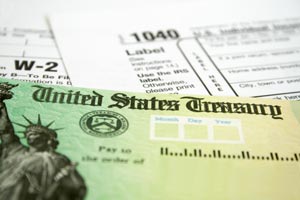WAIT … HURRY UP … WAIT
WAIT … HURRY UP … WAIT
The Tale of 2019 Tax Returns … Gridlock!
We all know the frustrations induced by unintended consequences … especially when it impacts our pocketbooks. Well that’s the backdrop to the current stress experienced by many taxpayers who continue to lament – “Where’s my refund?!”
Some recent history, causes for delays, and what the current remedial landscape looks like.
In response to the COVID-19 pandemic, the IRS granted deferments in tax deadlines as well as changes in penalties and interest for late-filers. These concessions were intended to reduce taxpayer stress … already strained by the pandemic. While there may be taxpayers who have benefited from the above moves, our phone and email communications are rife with frustration, confusion and sometimes a touch of panic.
By the IRS’s own admission … they are swamped!
In their words, We’re open and processing mail, tax returns, payments, refunds and correspondence. However, COVID-19 continues to cause delays in some of our services. Our service delays include:
- Live phone support
- Processing tax returns filed on paper
- Answering mail from taxpayers
- Reviewing tax returns, even for returns filed electronically
The problem stems, of course, from COVID-19. In the spring of 2020, most of the federal government along with many private companies initiated pandemic protocols. That means most IRS offices were closed and work usually handled at those facilities went undone.
IRS office closures did not deter delivery of tax returns by the USPS. However, the later-than-usual arrival of returns this year was not due to the Postal Service. Instead, the filing deadline was extended until July 15 due to the pandemic. Millions of folks waited until then to mail their forms.
Trailers were set up outside IRS workplaces as receptacles for taxpayer mail. IRS employees who returned to address the tax season were met with the proverbial “drinking from a fire hose” metaphor as they sorted through and processed existing mail while the daily deluge of correspondence continued unabated.
The amount of unopened tax mail at one point was nearly 13 million. The IRS said that as of last Thanksgiving, the backlog has been trimmed to 7.1 million unprocessed individual tax returns and 2.3 million unprocessed business returns.
The unfortunate and unintended consequences for taxpayers have been that the IRS continues to send payment demand notices to taxpayers whose correspondence and payments remain unopened … but who have already made the payments that the IRS deems to be due.
Here’s the experience suffered by one of our clients … who will remain anonymous, of course. This taxpayer electronically filed the 2019 tax return in April 2020 with money owed to the IRS. The payment was made well before the July 15th deadline. As of this writing, this compliant taxpayer’s check sits in a trailer while enduring notices that the amount due was not paid in a timely manner. The fear is the next step by the IRS will be to issue an “intent to levy” notice, even though the taxpayer was in compliance.
The IRS admits to being short on staff, many if not most agents remain furloughed. for opening the mail, plus dealing with the overwhelming volume of phone calls from taxpayers. Phone calls to the agency can leave the taxpayer on “hold” sometimes for hours. Important clarification requests go unanswered with the taxpayer left without knowing what to do next to remain in compliance.
The agency strongly urges against calling the IRS. “Due to high call volumes, the IRS suggests waiting to contact the agency about any unprocessed paper payments still pending,” said the IRS. “See www.irs.gov/payments for options to make payments other than by mail.”
In an attempt at fairness … not an excuse … the deferments in tax deadlines along with changes in penalties and interest for late-filers has put a tremendous strain on IRS resources. Procedures that have been in place and functioning are now either scrapped or subject to major revisions.
Couple that with the major pressures on IT to deliver software updates to accommodate the revised dates and details for taxpayer compliance. And then there is the human resource-based issues that require substantial re-training.
What’s a Taxpayer to Do?
The IRS initiated a short-term fix for taxpayer checks caught in the backlog of unopened mail. As detailed on the IRS webpage … pending check payments and payment notices will be posted as of the date received rather than the date when they are processed by the IRS. Note: To avoid penalties and interest, the IRS strongly advises taxpayers not to stop payment on their checks with their bank and ensure availability of funds, as the IRS will eventually get around to processing them.
If you filed electronically, you should be among those who https://www.irs.gov/advocate/local-taxpayer-advocate receive their refunds first, according to the IRS. You can check the status of your refund here.
If you’re still waiting for your federal return and suspect a problem, the IRS suggests you contact your local IRS and make an appointment for a face-to-face meeting. You can also contact your local tax advocate through the IRS’s website or call the IRS at 800-829-1040 Monday through Friday from 7 a.m. until 7 p.m.
If any of the foregoing seems unclear as to how it applies to your specific circumstances, please keep in mind that Pearson & Co. will help. Give us a call or drop an email. We’ll respond immediately


